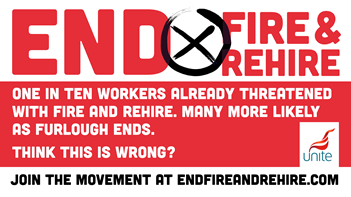Robbing the workers
The legally mandated national minimum wage (NMW) stands at a paltry £6.50 an hour, well below what’s considered the minimum to live a decent life. But companies raking in millions in profits are not even paying their workers that—and they’re breaking the law in the process.
The government revealed today (January 15) a list of 37 businesses which were found to have paid their workers less than the minimum wage. Among the companies listed, they owed almost ÂŁ200,000, with more than ÂŁ50,000 in fines. Employers crossed the board, from hairdressers to construction workers, security workers to cleaners.
Companies on the list include popular clothing retailer H&M, which owes 540 workers over ÂŁ2,000 in total. Another well-known company on the list was Welcome Break, which operates motorway service stations across the country.
TUC general secretary Frances O’Grady argued that the list was likely only the “tip of the iceberg”, adding that over 600 employers per year are found to be underpaying their workers, but the government’s “naming and shaming” scheme is too limited in scope to name all offenders.
“There are companies out there that cheat hundreds of staff out of a legal minimum wage — these are the biggest offenders and their pay crimes must be made public, too,” she said.
“Ministers must also step up enforcement action with more prosecutions, higher fines and a bigger team of enforcement officers to catch the cheats,” O’Grady added.
Enforcing the law
The TUC published a report last week that outlines ways in which the government can take steps to prevent this common crime, whose victims will struggle even harder to make ends meet.
The report lays out a 10-point plan, which includes:
• Restore the budget for raising awareness about the minimum wage to £1m
• Hire 100 more HM Revenue and Customs (HMRC) enforcement officers
• Better official guidance on the minimum wage so that employers know their responsibilities
• Create legal gateways so that HMRC can share information about enforcement with local authorities and the transport regulatory authorities
• Name and shame all non-payers
• Government to guarantee arrears if employer goes bankrupt or simply vanishes
• Adopt a prosecution strategy targeted towards the worst offenders and increase maximum fine from £5,000 to £75,000
• More targeted enforcement for high-risk sectors
• Make government funding for training apprentices dependent on employers paying the minimum wage, and create a duty for training providers to check that the minimum wage is paid
• Promote collective bargaining so that trade unions can deal with more minimum wage problems themselves.
The report found that simple wage theft has evolved into newer, less obvious methods for robbing workers their due. Some of these tactics include mislabelling workers as self-employed, interns or volunteers; forcing workers to pay for uniforms, tools and training or travel; using complex piece-rates to set impossible targets; and under-recording hours so that paperwork appears correct.
Minimum wage value plunging
Despite the NMW rising every single year—in 2014, it went from £6.31 to £6.50—its real terms value has plunged over the past decade, which highlights just how important it is that minimum wage laws are enforced.
As the Resolution Foundation found in 2013, when the cost of living is included, the value of the minimum wage has dropped by more than ÂŁ1,000 a year since 2008.
Kieran Duffy is one minimum wage worker who knows from first-hand experience just how difficult it is to live on the legal minimum.
Duffy, a waiter who’s been on the NMW for over a decade, explains that living now has become all but impossible. He notes the doubling or trebling of prices in basic necessities, from transport to rent to meat and even bread.
“Just a few years ago, I remember paying £450 a month for a decent 3 bed flat,” he said. “Now, my children are paying £500 for just a room in really dingy conditions.”
“I haven’t had a holiday in years,” Duffy added.
Unite assistant general secretary Steve Turner argued that it was time the government took minimum wage violations seriously, especially in light of the soaring cost of living.
“It is an outrage that so many businesses are allowed to get away with ignoring the law and cheating workers out of what’s already a pittance of a minimum wage,” he said. “The real-terms value of the minimum wage has already plummeted over the past decade, and the millions of workers on it are in a constant struggle with debt, extortionate rents, growing energy bills and feeding their families. These crooks are flagrantly violating the law and should be treated like the criminals they are — in courts, fined and imprisoned.”
“â€Naming and shaming’ these employers might shed light on the problem, but the real answer is to enforce the law, support strong and powerful trade unions and legislate to introduce a system of sector level collective bargaining to address low and exploitative pay,” Turner added. “The current fine is nothing but a slap on the wrist. You can be fined more for flogging a dodgy football shirt than exploiting working people, something that sums up this government’s approach to supporting the victims of this and other corporate crimes.”
Unite has called for an immediate rise in the minimum wage to ÂŁ7.80 an hour, a wage that the union has found to be entirely affordable for businesses.
 Like
Like Follow
Follow


